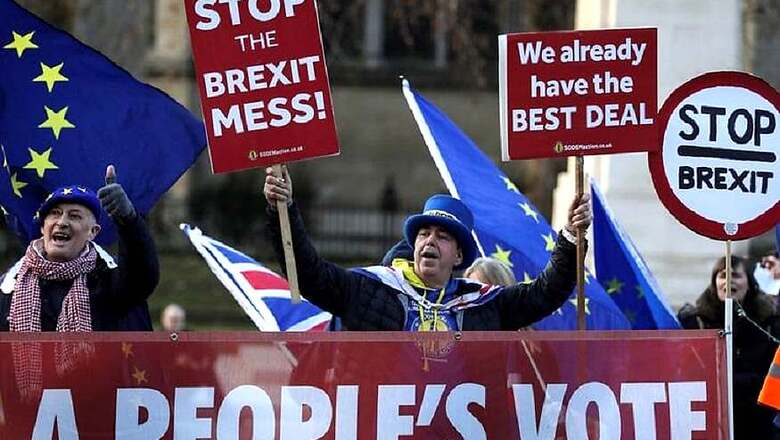
views
London: The UK Parliament will vote on a crucial set of amendments later on Tuesday to determine the future course of Brexit as British Prime Minister Theresa May agreed to go back to the European Union (EU) to reopen negotiations on a legally-binding Withdrawal Agreement.
The British premier opened the latest round of Brexit debates in the House of Commons saying she had listened to the MPs who had voted down her previous deal struck with the EU earlier this month and that she would go back to Brussels to get a "significant and legally binding change" to the controversial Irish backstop proposal.
The issue, an insurance policy against post-Brexit border checks between the UK and Ireland, has been the main stumbling block to striking a withdrawal agreement acceptable to most British MPs.
The EU has repeatedly ruled out reopening the Withdrawal Agreement, something May admitted would be a struggle.
"Reopening the Withdrawal Agreement would have limited appetite among European partners but with mandate from this House I can secure such a change," she told the Commons, soon after it emerged that she had told her Cabinet at Downing Street that she intends to go back to the EU to seek a change to the agreement after her historic defeat in the House on January 15.
"The vote was decisive, and I listened. So, the world knows what this House does not want. Today we need to send an emphatic message about what we do want," she said in her opening statement to Tuesday's Brexit debate.
May told Parliament that she hopes to bring a revised deal back as soon as possible. If no new deal is reached with the EU by February 13, the British PM will make a statement to the Commons and table an amendable motion for debate on February 14, once again re-opening discussions on how to move forward with Brexit.
Meanwhile, Commons Speaker John Bercow announced a list of seven amendments that will be debated and move forward for a vote on Tuesday evening. The UK government has given its backing to a motion tabled by Conservative Party MP Graham Brady, calling for "alternative arrangements" to the backstop.
May said backing it would "give the mandate I need to negotiate with Brussels an arrangement that commands a majority in this House not a further exchange of letters, but a significant and legally binding change to the Withdrawal Agreement".
Another key amendment to be debated has been tabled by Opposition Labour MP Yvette Cooper to delay the Brexit deadline of March 29 by up to nine months.
This amendment has the backing of the Labour Party and a number of other anti-Brexit MPs, which would create a bill enabling Article 50 the mechanism by which the UK leaves the EU to be delayed if the government does not have a plan agreed in Parliament by the end of February.
The Labour Party said it was supporting the amendment because the bill it would create could "give MPs a temporary window to agree a deal that can bring the country together".
Opposition leader Jeremy Corbyn repeated his demand for the government to take the prospect of a no-deal completely off the table.
However, plans for a no-deal scenario remain ongoing in the background, with some reports suggesting that thousands of defence officials are likely to be redeployed to help the government cope in the immediate aftermath of Britain crashing out of the EU without any agreement in place.
Supplies of medicine and shipments of food are also likely to be hit, with UK ministers saying they are working on contingency plans in the event of such a scenario.
Retailers have warned that a no-deal Brexit could threaten the UK's food security and result in empty supermarket shelves due to lack of products that currently travel smoothly across borders.

















Comments
0 comment